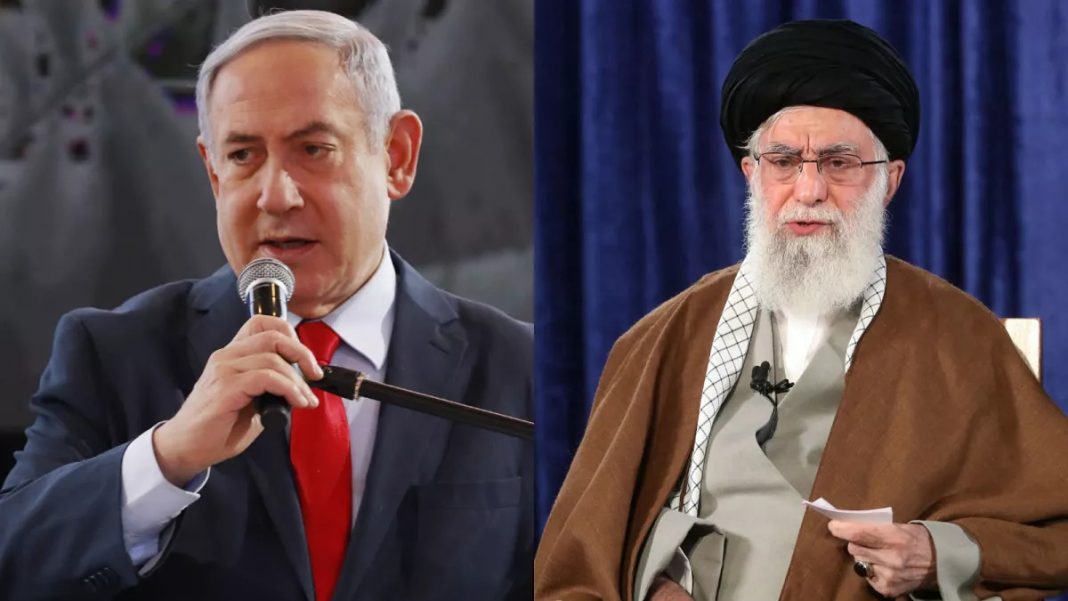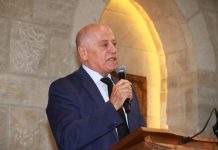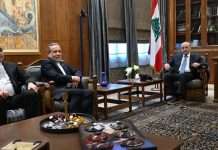Final Preparations Before Striking the Iranian Nuclear Reactors
Colonel Charbel Barakat/June 07/2025
التحضيرات النهائية قبل ضرب المفاعلات النووية الإيرانية
الكولونيل شربل بركات/07 حزيران/2025
قامت الطائرات الاسرائيلية ليل أمس وبعد انذار للأهالي بقصف مركز على مواقع يقال بأنها تحوي مصانع لمسيرات يقوم حزب الله بتحضيرها للمواجهة مع اسرائيل. حزب الله الذي لم يقبل بتسليم أسلحته للدولة اللبنانية ولا تمت محاكمته على قراره زج لبنان بحرب دمرت اقتصاده وبنيانه وتسببت بمقتل الآلاف من أبنائه، لا يزال يراهن على استعماله من قبل الإيرانيين في صراعهم مع اسرائيل، والذي يتمحور حول سيطرة إيران على الشرق الأوسط وكل مقدراته باستعمال لازمة محاربة اسرائيل لتبرير مخططاتها.
بالرغم من كل المتغيرات التي حدثت منذ عملية طوفان الأقصى، التي كان هدفها تأليب الرأي العام في الشارع العربي ضد مبادرة السلام الابراهيمي لمنع أي تفاهم عربي -اسرائيلي حول الحلول المطروحة، لا يزال الإيرانيون يسعون للحصول على القدرات النووية العسكرية لفرض واقع جديد على الساحة يعطيهم امكانية التحكم بمجريات الأمور. فالبرنامج النووي الإيراني لم يكن مرة بريئا أو بعيدا عن الاهداف العسكرية، وجل ما في الأمر أن القيادة الإيرانية ترغب بامتلاك القدرات النووية لفرض وجودها على دول المنطقة بالقوة، وهي تعتبر بأن هذه الدول الحديثة العهد ما هي إلا صنيعة الاستعمار الغربي لكي يستمر بالسيطرة على ثروات المنطقة التي لهم الحق باستغلالها منفردين عندما يعيدون فرض سيطرتهم عليها.
الشيعة اللبنانيون، الذين تعمّقوا بالفكر الإيراني وبالاهداف البعيدة المدى وتقبّلوها بكل رحابة صدر، جنّدوا الكثيرين في هذا الاتجاه ودفعوا ليصبح هؤلاء عناصر مقاتلة في جيش الولي الفقيه الذي سيحكم برأيهم المنطقة. ومن هنا فلا بأس بالخسائر المؤقتة والتضحيات التي ستنتج خيرات عند البدء بالتحكّم في شعوب الشرق الأوسط وثرواته. وقد جربوا عدة مرات كيفية ابتزاز الدول العربية الغنية للوصول إلى فرض السيطرة الإيرانية عليها. من هنا نفهم عدم اكتراث القيادات الروحية والزمنية من الطائفة الشيعة لكل الخسائر بالأرواح والمقتنيات التي تنتج عن العمليات العسكرية، لأن كل ذلك سينتهي فور التوصل إلى فرض الحالة الجديدة. فدول الغرب تخاف القتال، والدول العربية الغنية كذلك. من هنا وفور التوصل إلى أن تصبح إيران قوة نووية سيتغير الوضع رأسا على عقب، وسوف يضطر الغرب إلى الانسحاب بكل اساطيله والرضوخ لموازين القوى الجديدة. ولن تكون اسرائيل، إذا بقيت، سوى إحدى محميات دولة الولي الفقيه. وسوف تنسحب من الولاء الغربي لتتعاون مع القوة الاقليمية الكبرى التي ستفرض سياساتها وتوجهاتها.
نتانياهو، الذي لم يقبل بأن يهدد مستقبل الشعب اليهودي، قرر الانتفاض والرد بقوة ومن دون حساب للرأي العام العالمي، الذي عبأته الماكينة الاعلامية الإيرانية تحت عناوين الانسانية وقتل الأبرياء. وهو قام بالتركيز على قتال العدو القريب وتنظيف البيت. وما رأيناه من تصرّف نصرالله “الموزون” نوعا ما، بفتح الحرب بشكل متصاعد ومن دون تسرّع، كان يهدف إلى ابقاء النار مشتعلة وكسب الوقت بدون خسائر كبرى، لكي تتمكن القيادة في طهران من التوصل إلى أهدافها والامساك بكل خيوط اللعبة. ولكنهم لم يستوعبوا قدرة اسرائيل ولا تصميم نتانياهو على القتال لاعتباره بأنها معركة وجودية. من هنا الهجومات النوعية والدفع المتواصل للانتهاء من الحزب ومن حماس ونقل المعركة إلى داخل إيران.
عندما اشتدت المعركة وكثرت الخسائر في جانب الحزب طلبت القيادة الإيرانية منه العمل على وقف القتال قبل خسارة كل شيء، ومن هنا كانت حركة الاستاذ بري رئيس المجلس وحكومة ميقاتي للعمل على وقف اطلاق نار بدون شروط وذلك بهدف التمكن من اعادة لملمة الاشلاء وتخليص ما أمكن من المخزون الاستراتيجي ولكي يعاد تأهيل من تبقى وتنظيم الطاقات لاستعمالها في المرحلة المقبلة. فالإيرانيون لم ييأسوا لا بل زادهم اندفاع تجارب الماضي مع الحكومات الغربية التي لا نفس لها فهي تتغير أولوياتها بسرعة، ويمكن شراء الوقت بالتفاوض الذي لا يمكن أن ترفضه هذه الحكومات. وبالرغم من أن الرئيس ترامب يعتبر من الصقور وله راي يختلف عن غيره، إلا أن الخبرة الإيرانية بالمساومة وتضييع الوقت كافيان لتأجيل اي عمل يمكن معه وقف الشق العسكري من البرنامج النووي الإيراني نهائيا، أي بمنع إيران من امتلاك وسيلة التخصيب داخل أراضيها والتي تمكنها في أي وقت من اختراع سبب للعودة إلى التخصيب لمعدلات تصلح لصنع اسلحة نووية.
لكن الأمور لن تجري كما يتمناها الإيرانيون وقد يضطر الاسرائيليون إلى ضرب المفاعلات النووية وغيرها من الأهداف المهمة ما سيفتح الباب للرد الإيراني. ومن هنا لا يزال البعض يعتقد بأن حزب الله يملك اسلحة وصواريخ سيضطر إلى استعمالها ضد اسرائيل لدعم هكذا رد، وبالتالي سيتلقى لبنان ضربات مؤلمة تذكّرنا بما جرى قبل وقف اطلاق النار. فهل إن الضربة الاسرائيلية الأخيرة جاءت ردا على زيارة الوزير الإيراني التي لم تكن زيارة رسمية للبنان، بل ذكرت بزيارة نجاد؟ وهل هي محاولة لافهام الحكم بأن الأمور ستتطور سلبا وعليه استخلاص العبر، ما لم تعكسه تصاريح الرئيس ولا قيادة الجيش؟ أم أنها فقط جزء من التحضيرات الاسرائيلية لتلافي المزيد من الاخطار عند وقوع الواقعة؟ الأيام الآتية كفيلة بتوضيح الصورة ولكن ما فهم منها حتى الآن لا يبشر بالخير ولا بصيف واعد في لبنان. لا بل وكأن لبنان لم يخرج بعد من قمقم الحروب المفروضة عليه والتبعية التي لم يعرف التخلص منها بعد.
Final Preparations Before Striking the Iranian Nuclear Reactors
Colonel Charbel Barakat/June 07/2025
Last night, Israeli aircraft, after issuing warnings to civilians, launched a heavy bombardment on sites in Beirut’s southern suburb, known as Dahieh al-Janoubieh, believed to house drone factories that Hezbollah had been preparing for confrontation with Israel. Hezbollah, which has neither surrendered its weapons to the Lebanese state nor faced accountability for dragging Lebanon into a devastating war—one that crippled the economy, destroyed infrastructure, and killed thousands—continues to gamble on being used by Iran in its broader conflict with Israel. At the heart of this conflict lies Iran’s ambition to dominate the Middle East and control its resources, all under the pretext of confronting Israel.
Despite the significant regional shifts following Operation Al-Aqsa Flood—an Iranian-orchestrated initiative meant to turn Arab public opinion against the Abraham Accords and block any Arab-Israeli rapprochement—Tehran persists in pursuing military nuclear capabilities. The objective is to impose a new regional order that positions Iran as the dominant force. Iran’s nuclear program was never peaceful nor devoid of military aims. Its leadership seeks nuclear power to impose hegemony over neighboring states, which it views as artificial constructs of Western colonialism designed to exploit the region’s wealth. In Tehran’s eyes, Iran alone holds the rightful claim to these resources once it reestablishes control.
Many Lebanese Shiites, having fully embraced Iranian ideology and long-term goals, have been recruited into this cause, becoming fighters in the army of the Supreme Leader (Wilayat al-Faqih). They believe he is destined to rule the region. In this context, temporary losses and sacrifices are acceptable—seen merely as steps on the path toward eventual control of the Middle East’s peoples and wealth. Iran has repeatedly attempted to blackmail wealthy Arab states as a means of asserting dominance. This ideology explains the indifference of Shiite religious and political leaders to the massive loss of life and property resulting from Hezbollah’s military actions. They believe that such suffering will cease once their new order is established.
The Iranian regime views both the West and wealthy Arab nations as unwilling to engage in direct conflict. Therefore, it believes that once Iran becomes a nuclear power, the regional equation will shift irreversibly. The West will be forced to withdraw its fleets and accept the new balance of power. As for Israel, if it survives, it will be reduced to a protectorate of the Iranian regime—abandoning its alignment with the West to coexist with the new regional hegemon dictating the course of events.
Refusing to allow the future of the Jewish people to hang in the balance, Prime Minister Netanyahu has opted for decisive action, unconcerned with global public opinion—opinion heavily shaped by Iran’s propaganda machinery portraying humanitarian crises and civilian suffering. Netanyahu remains focused on the immediate enemy and on “cleaning house.”
Hezbollah late Secretary-General Hassan Nasrallah’s strategy of gradual escalation—designed to prolong the conflict without heavy losses—was clearly intended to buy time for Tehran to maneuver diplomatically and militarily. But both he and his Iranian patrons miscalculated Israel’s military capabilities and Netanyahu’s iron determination, especially in what he sees as an existential confrontation. This explains Israel’s precision strikes, its relentless campaign to eliminate Hezbollah and Hamas, and its preparations to move the confrontation into Iranian territory itself.
As the conflict escalated and Hezbollah suffered substantial losses, Iran instructed its proxy to seek a ceasefire in order to avoid a complete collapse. This led Parliament Speaker Nabih Berri and Prime Minister Najib Miqati’s government to push for an unconditional truce. The goal was to regroup, preserve what strategic assets remained, and prepare for future phases. Iran has not given up. On the contrary, its past experiences with indecisive Western governments—prone to shifting priorities—have emboldened it. Tehran believes it can continue to stall for time through negotiations that the West is unlikely to refuse.
Even under a President like Donald Trump—perceived as a hawk with a firm stance—Iran is confident in its ability to prolong negotiations indefinitely. The regime knows how to navigate diplomacy and stall long enough to preserve the core of its nuclear program: the domestic enrichment capacity that would allow it, at any moment, to resume weapons-grade production under any pretext.
But events may unfold differently from what Iran anticipates. Israel may find itself compelled to strike Iran’s nuclear reactors and other strategic sites—an act that would almost certainly provoke a fierce Iranian response. Many believe Hezbollah still holds advanced weaponry and missiles it would be ordered to launch in retaliation, bringing about catastrophic consequences for Lebanon reminiscent of the devastation prior to the latest ceasefire.
Was the Israeli airstrike last night a response to the Iranian minister’s visit to Lebanon—an unofficial visit echoing the Ahmadinejad era—or was it a message to the Lebanese government that failure to adapt will result in further escalation? The silence from Lebanon’s president and army command suggests this message fell on deaf ears. Or perhaps the strike is simply part of Israel’s broader strategy to neutralize threats in advance of a larger, more decisive move.
The coming days will reveal more, but what is already clear is deeply troubling. Lebanon appears headed for yet another summer of instability—trapped once again in the cycle of externally imposed wars and its own political subservience, from which it has yet to liberate itself.
Colonel Charbel Barakat
***Colonel Charbel Barakat, a retired Lebanese Army officer, historian, terrorism expert, and author of numerous works on Lebanon, the Iranian regime’s schemes, and jihadist movements, has testified multiple times before the U.S. Congress on critical issues, including Iranian and Syrian terrorism, the Syrian occupation of Lebanon, jihadist threats, and the pursuit of Middle East peace.






















